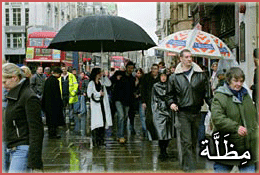-
Great insights Desmond. Here in New Jersey, in the U.S.A., I believe we would generally view a parasol as a portable and likely decorated protection from the sun which is most likely to be used at formal gatherings (see http://www.lunabazaar.com/paper-parasols.aspx). We do use the term "beach umbrella" for a canopy inserted into the sand to shield us from the sun (see http://www.shadeusa.com/beach_umbrellas.htm). ;-) Nice lesson.
-
Dear Charles,
Theoretically, “parasol” is a hyponym of “umbrella” (cf. the definition of “parasol” in “Collins English Dictionary”). In practice, however, “umbrella” normally denotes a portable and collapsible canopy which offers protection from rain and other forms of precipitation. If the device in question is designed to offer protection from the sun, “parasol” or “beach umbrella” will be used in preference to “umbrella”.
In the nineteenth century American and European women often went around with parasols in the summer months because a pale complexion was considered to be a sign of prestige. Upper class ladies avoided tanning because they did not want to look like peasants.
In French and German a clear distinction is made between devices which offer protection from rain and those which offer protection from the sun. “Umbrella” is “parapluie” in French, and the second element of “parapluie” is the noun “pluie” (cf. Lat. pluvia), which means “rain”. There are two words for “parasol”: “ombrelle” and “parasol”. An “ombrelle” is a portable device used exclusively by women, while a “parasol” is a fixed canopy used to protect people who are sitting around a table or lying on a beach. “Ombrelle” is a derivative of “ombre” (cf. Lat. umbra), which means “shade” or “shadow”, while “parasol” consists of the combining form “para-” and “sol” (the Latin word for “sun”). The corresponding German terms are “Regenschirm” and “Sonnenschirm”. “Regen” is “rain”, “Sonne” is “sun”, and “Schirm” is “screen” or “shield”. Both “Regenschirm” and “Sonnenschirm” are shortened to “Schirm” when the intended meaning is clear from the context. -
The use of the cardinal number ﺃﻠﻒ ('alf) in this podcast calls for a few remarks. Like the French number “mille”, ﺃﻠﻒ ('alf) is often used in hyperbolic utterances (e.g. c’est mille fois trop grand = it’s miles too big). In English the word “thousand” is rarely used in this way. The most natural English equivalents of “'alf midhalla” would be “lots of umbrellas”, “tons of umbrellas” or “loads of umbrellas”.
Since “'alf” is a very old word, it is hardly surprising that it is not used in the same way as its literal English equivalent. What is more surprising is that more recent expressions like “no-fly zone” and “mintaqa hadhr tayaraan” are not employed in the same way in the Arab and English media. Yesterday a new article appeared in the Arabic version of Wikipedia. It is entitled “mintaqa hadhr tayaraan” and linked to similar articles in other languages (e.g. “Flugverbotszone” in the German version and “zone d’exclusion aérienne” in the French version). “Mintaqa hadhr tayaraan” is a fairly close equivalent of “no-fly zone”. “Mintaqa” means “zone”, “hadhr” is “prohibition” and “tayaraan” (the verbal noun of “taara”) can mean “aviation”, “flight” or “flying”. In the Arab media, however, the commonest term seems to be “hadhr (ﺤﻈﺮ) jawwiyy (ﺠﻮﻱ)”, which means “flying ban”. I’ve heard this expression hundreds of times, and I’ve found numerous examples in Arabic newspapers and on the websites of Arab radio stations.
At present everyone is talking about the no-fly zone which has just been approved by the U.N. Security Council (majlis al-amn). “Flying ban” is hardly ever used in this context although it was frequently employed last year when smoke and ashes from an Icelandic volcano disrupted international air traffic (cf. The Guardian 16.4.2010). Perhaps Ehab would like to comment on this point of usage and tell us what he has found in the Jordanian media. -
I'm an Arabic native speaker.I'd like to exchange Arabic-English with you.I'll help you with your Arabic while you help me with my English?.Thanks :)
Beginner - Forgot my umbrella
| March 15th, 2011 | 1 comment |
Most of us have umbrellas at home, which make it even more annoying when you get caught in the rain and you don't have one with you at the time. Hopefully, if you get in such a situation you will be lucky enough to receive a helping hand, like the guy in today's dialogue.
 MP3 Download MP3 Download
|
 PDF Transcript PDF Transcript |
 Audio Transcript Audio Transcript Exercise Exercise |
| Free | Basic | Premium |
|---|
Join the Discussion

Like this on facebook!

Random Word
صحيح |
|

Advertisement



In modern English “umbrella” invariably denotes a device that offers protection from rain. A canopy that offers protection from the sun is called a parasol. In the nineteenth-century umbrellas were sometimes called umbersticks, and in contemporary English an umbrella can also be called a brolly or a gamp.
Even in Saudi Arabia an umbrella may sometimes come in handy. Have you forgotten the Jeddah floods (ﺴﻴﻮﻞ), Mohamed?